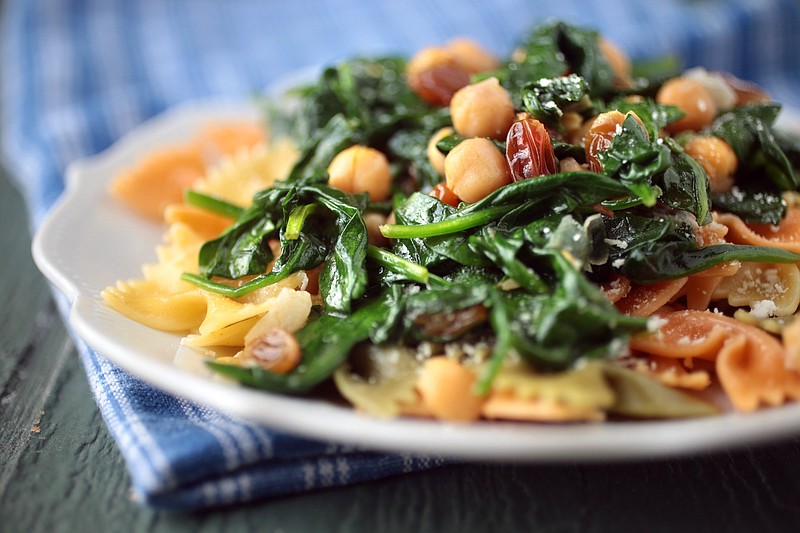The doctor says you have to lower your sodium. It's stunning news. After all, salt is what makes food taste like food. On the other hand, eating too much salt can be devastating to your health.
According to the Harvard School of Public Health, too much sodium in the bloodstream can lead to high blood pressure, heart attacks, stroke, heart failure, possibly to stomach cancer and even to osteoporosis.
Photo Gallery
Grumpy's
Hanging out at Grumpy's with the musical talent of Barrett Baber on Thursday, January 3.
If you must switch to a low-sodium diet, it would be wise to eliminate any prepared or processed foods from your mealtime or snacks-no more Cheesy Poofs, no more trips to Burger Doodle.
Canned foods are generally awash in sodium, which is used as a preservative, so it is better to use frozen vegetables, say, than canned. Fresh vegetables are best of all, of course, because you can control the amount of salt you use.
In a similar vein, homemade foods are better for anyone on a low-sodium diet than store-bought or restaurant-made, because you know how much salt you are getting. A chef's idea of low salt may be different from your idea, or your doctor's.
But if you need a low-sodium diet, what can you do to replace the flavor-enhancement that is provided by salt? There are several tricks, but the idea behind them all is to add pleasing but assertive flavors.
Lemon is probably used the most, because its bright acidity mimics the effects of salt. Fresh herbs also help to awaken dormant flavors, and so does garlic.
For the first dish of my exploration of a low-sodium diet, I made a White Bean and Roasted Garlic Dip, which makes full use of lemon and garlic-and, at least in the garnish, fresh herbs.
This dip is a great example of a low-sodium replacement for a familiar dish-in this case, hummus. Hummus is one of the best things ever, but a quarter-cup of it contains more than 200mg of sodium. White bean dip comes in at one-third of that.
It's made in much the same way as hummus, without tahini and with white beans replacing the garbanzo beans. Because the beans are softer, it takes on a satiny feel. And it has every bit as much flavor.
The only problem is that it looks so much like hummus that your guests are likely to expect hummus when they try it. When they get over their initial disappointment, they may find they enjoy it every bit as much as the saltier stuff.
My next dish, an entree, used an unexpected strong flavor to make up for the relative lack of sodium: coffee. It's a pot roast braised in coffee, with caramelized onions, and the best part about it is you can't even tell it's coffee. It just lends a depth and a dark richness to the meat that you sense, rather than taste.
Balsamic vinegar also helps to amplify the flavor in place of salt in this dish, along with a good dose of garlic.
But don't kid yourself; beef needs salt. This pot roast has salt in it. It's considerably less than you will find in other pot roast recipes, but it isn't exactly salt-free.
If you want salt-free, you might want to go with something such as French Country Chicken With Mushroom Sauce. It's chicken breast halves pounded flat and sauteed, and served with a sauce.
The flavor comes from the sauce. It's made from a thickened mixture of shallots, mushrooms, wine and chicken stock. Fresh rosemary, which always pairs well with chicken, adds an additional boost.
For a delightfully unusual dish, try Pasta With Spinach, Garbanzos and Raisins. Spinach and garbanzo beans (also called chickpeas) is not an entirely uncommon combination, but when you add golden raisins to it that just makes the whole dish sing.
It has garlic too, of course. Garlic and spinach go together like salt and pepper, and somehow it doesn't fight the raisins at all. Parmesan cheese on top brings the whole dish together and even adds a salty flavor while not contributing too much to the sodium count.
For breakfast or dessert, or both, you can make Whole Wheat Applesauce Muffins. These come from the American Heart Association, so you know they are good for your heart if not necessarily for your waistline.
What makes them heart healthy? They are sweetened and moistened with applesauce-unsweetened applesauce, at that. Cinnamon, nutmeg, cloves and raisins only make them more festive.
And there is no butter at all. But to replace it, it calls for oil-quite a lot of oil. And brown sugar gives them depth. The calorie count isn't too high, but neither is it too low.
In terms of salt-free flavor, though, they are out of this world.
WHITE BEAN AND ROASTED GARLIC DIP
Yield: 10 servings
2 whole garlic heads
4 tablespoons extra-virgin olive oil, divided
2 (15-ounce) cans canellini beans or other white beans, drained and rinsed
1/4 cup fresh lemon juice
1/4 teaspoon salt
1/4 teaspoon white pepper
1/4 cup flat-leaf parsley
1. Preheat oven to 375 degrees.
2. Cut the top 1/3 off garlic heads off so tops of the cloves are exposed, and discard tops. Place heads, unpeeled, in ovenproof dish and drizzle with 1 tablespoon of the oil. Cover with aluminum foil; bake 30 minutes.
3. Uncover and bake until the garlic cloves are soft and golden brown, 15 to 30 minutes more. This roasted garlic can be made up to 5 days in advance and stored in an airtight container in the refrigerator.
4. In a food processor, combine the beans, the remaining 3 tablespoons of oil and the lemon juice. When the garlic heads are cool enough to touch, squeeze out the soft garlic into the processor and process until smooth. Add the salt and white pepper. This dip will keep up to 3 days in an airtight container in the refrigerator.
5. To serve, transfer to a bowl, garnish with the parsley leaves and serve with vegetables or pita.
Per serving: 205 calories; 6 g fat; 1 g saturated fat; no cholesterol; 11 g protein; 29 g carbohydrate; 1 g sugar; 7 g fiber; 67 mg sodium; 112 mg calcium
COFFEE-BRAISED POT ROAST WITH CARAMELIZED ONIONS
Yield: 10 to 12 servings
4 pounds beef chuck roast, trimmed of fat
1/2 teaspoon salt, or to taste
Pepper, to taste
4 teaspoons olive oil, divided
2 large onions, halved and thinly sliced
4 cloves garlic, minced
1 teaspoon dried thyme
3/4 cup strong brewed coffee
2 tablespoons balsamic vinegar
2 tablespoons cornstarch mixed with 2 tablespoons water
1. Preheat oven to 300 degrees.
2. Season beef with salt and pepper. Heat 2 teaspoons oil in a Dutch oven or soup pot over medium-high heat. Add beef and cook, turning from time to time, until well-browned on all sides, 5 to 7 minutes. Transfer to a plate.
3. Add the remaining 2 teaspoons oil to the pot. Add onions, reduce heat to medium and cook, stirring often, until softened and golden, 5 to 7 minutes. Add garlic and thyme; cook, stirring, for 1 minute. Stir in coffee and vinegar; bring to a simmer. Return the beef to the pot and spoon some onions over it. Cover and transfer to the oven.
4. Braise the beef in the oven until fork-tender, but not falling apart, 2 1/2 to 3 hours. Transfer beef to a cutting board, tent with foil and let rest for about 10 minutes.
5. Meanwhile, skim fat from braising liquid; bring to a boil over medium-high heat. Add the cornstarch mixture and cook, whisking, until the gravy thickens slightly, about 1 minute. Season with pepper. Carve the beef and serve with gravy. The pot roast will keep, covered, in the refrigerator for up to 2 days. Reheat meat slices and sauce, covered, in the oven, microwave or on the stove.
Per serving: 258 calories; 9 g fat; 3 g saturated fat; 113 mg cholesterol; 38 g protein; 5 g carbohydrate; 2 g sugar; 1 g fiber; 180 mg sodium; 28 mg calcium
Nutrition analysis calculated for 10 servings. Recipe by Patsy Jamieson, from eatingwell.com
FRENCH COUNTRY CHICKEN WITH MUSHROOM SAUCE
Yield: 4 servings
4 boneless, skinless chicken breast halves, 4 ounces each
2 tablespoons olive oil, divided
1 shallot, thinly sliced
1/4 pound mushrooms, thinly sliced
1 tablespoon all-purpose flour
1/4 cup white wine
1/2 cup low-sodium chicken stock
1 tablespoon fresh rosemary or 1 teaspoon dried rosemary
2 tablespoons chopped parsley
1. Place the chicken breasts between waxed paper and pound with a mallet to flatten. Cover with plastic wrap and refrigerate until firm.
2. In a medium frying pan, heat 1 tablespoon of the olive oil over medium heat. Add the shallots and saute for about 3 minutes. Add the mushrooms and cook 2 minutes more, stirring occasionally.
3. In a small bowl, whisk together the flour and wine until all lumps are gone. Add the flour mixture to the shallots and mushrooms. Stir in the chicken stock and cook over medium-high heat. Stir until the sauce thickens, about 5 minutes. Remove from heat and add the rosemary.
4. In a large, nonstick skillet, heat the remaining 1 tablespoon of olive oil over medium heat. Add the chicken and saute until no longer pink or a thermometer inserted into the chicken reads 170 degrees.
5. To serve, transfer the chicken breast halves onto each plate. Spoon mushroom sauce over the chicken and garnish with parsley. Serve immediately.
Per serving: 231 calories; 10 g fat; 2 g saturated fat; 70 mg cholesterol; 27 g protein; 4 g carbohydrate; 1 g sugar; 1 g fiber; 74 mg sodium; 26 mg calcium
Adapted from a recipe by the Mayo Clinic
PASTA WITH SPINACH, GARBANZOS AND RAISINS
Yield: 6 servings
8 ounces dry bow-tie pasta
2 tablespoons olive oil
4 garlic cloves, crushed
1 cup canned garbanzo beans (chickpeas), drained and rinsed
1/2 cup chicken or vegetable broth
1/2 cup golden raisins
4 cups fresh spinach, chopped
2 tablespoons grated Parmesan cheese
Cracked black peppercorns, to taste
1. Fill a large pot 3/4 full with water and bring to a boil. Add the pasta and cook al dente, according to the package directions. Drain the pasta thoroughly.
2. Meanwhile, heat the olive oil and garlic in a large skillet over medium heat. Add the garbanzos and chicken or vegetable broth. Stir until warmed through. Add the raisins and spinach. Heat just until the spinach is wilted, about 3 minutes. Do not overcook.
3. Divide the pasta among the plates. Top each serving with 1/6 of the sauce mixture, 1 teaspoon Parmesan cheese and peppercorns to taste. Serve immediately.
Per serving: 316 calories; 7 g fat; 1 g saturated fat; 16 mg cholesterol; 10 g protein; 57 g carbohydrate; 16 g sugar; 4 g fiber; 153 mg sodium; 72 mg calcium
WHOLE-WHEAT APPLESAUCE MUFFINS
Yield: 9 muffins
1/2 cup oil
3/4 cup brown sugar
1 cup applesauce, unsweetened
1 teaspoon baking soda
1 1/2 cups unsifted whole-wheat flour
1 teaspoon cinnamon
1/4 teaspoon ground nutmeg
1/4 teaspoon ground cloves
1/4 cup raisins
1. Preheat oven to 375 degrees. Grease nine molds in a muffin tin with nonstick spray or butter.
2. Mix together the oil and brown sugar until smooth. Mix in the applesauce and baking soda.
3. Add the flour, cinnamon, nutmeg and cloves, blending thoroughly. Stir in raisins. Portion out into the prepared muffin tin and bake 30 minutes. Cool on a wire rack.
Per serving: 276 calories; 13 g fat; 1 g saturated fat; no cholesterol; 3 g protein; 40 g carbohydrate; 24 g sugar; 3 g fiber; 146 mg sodium; 28 mg calcium
Adapted from "The American Heart Association Cookbook" (1973).


